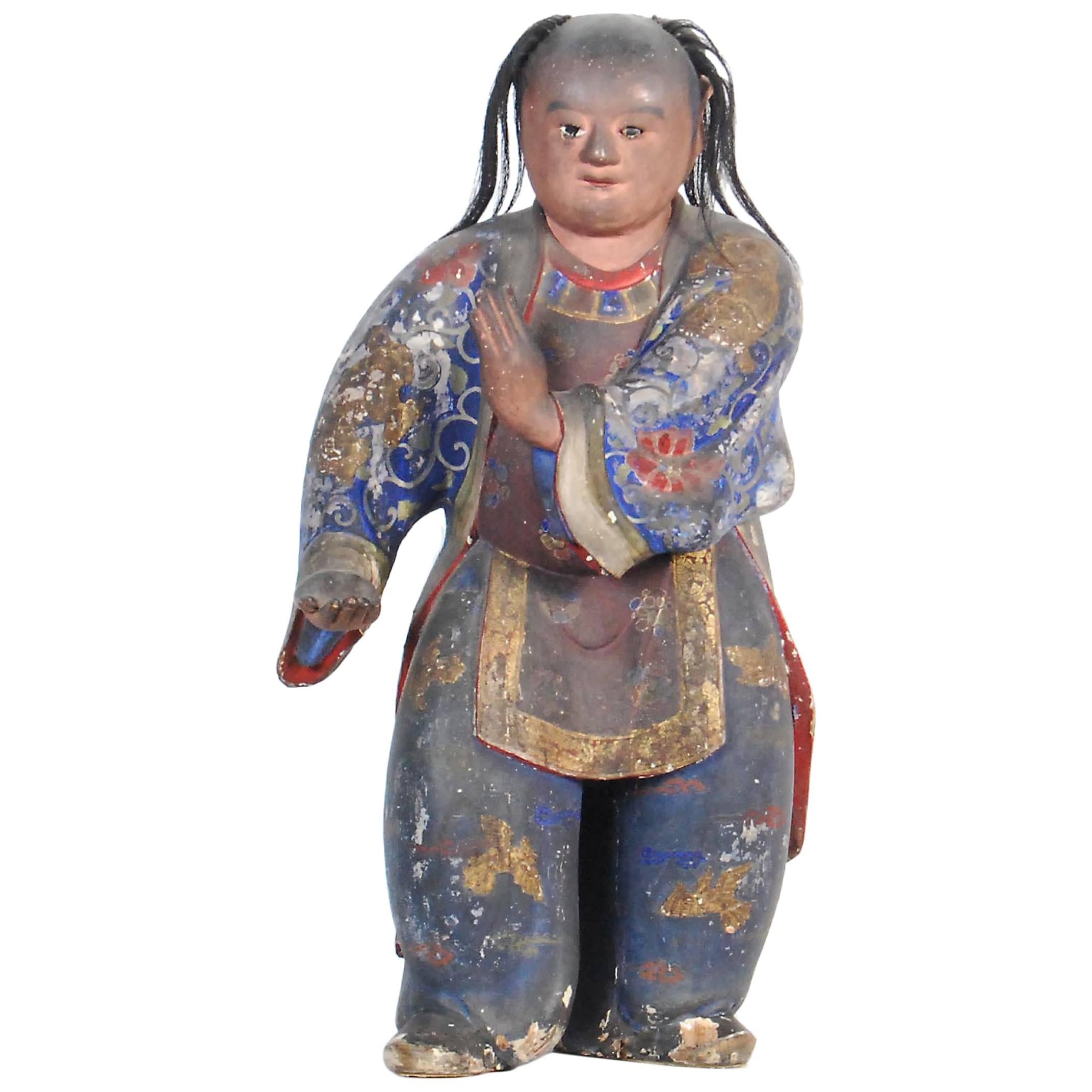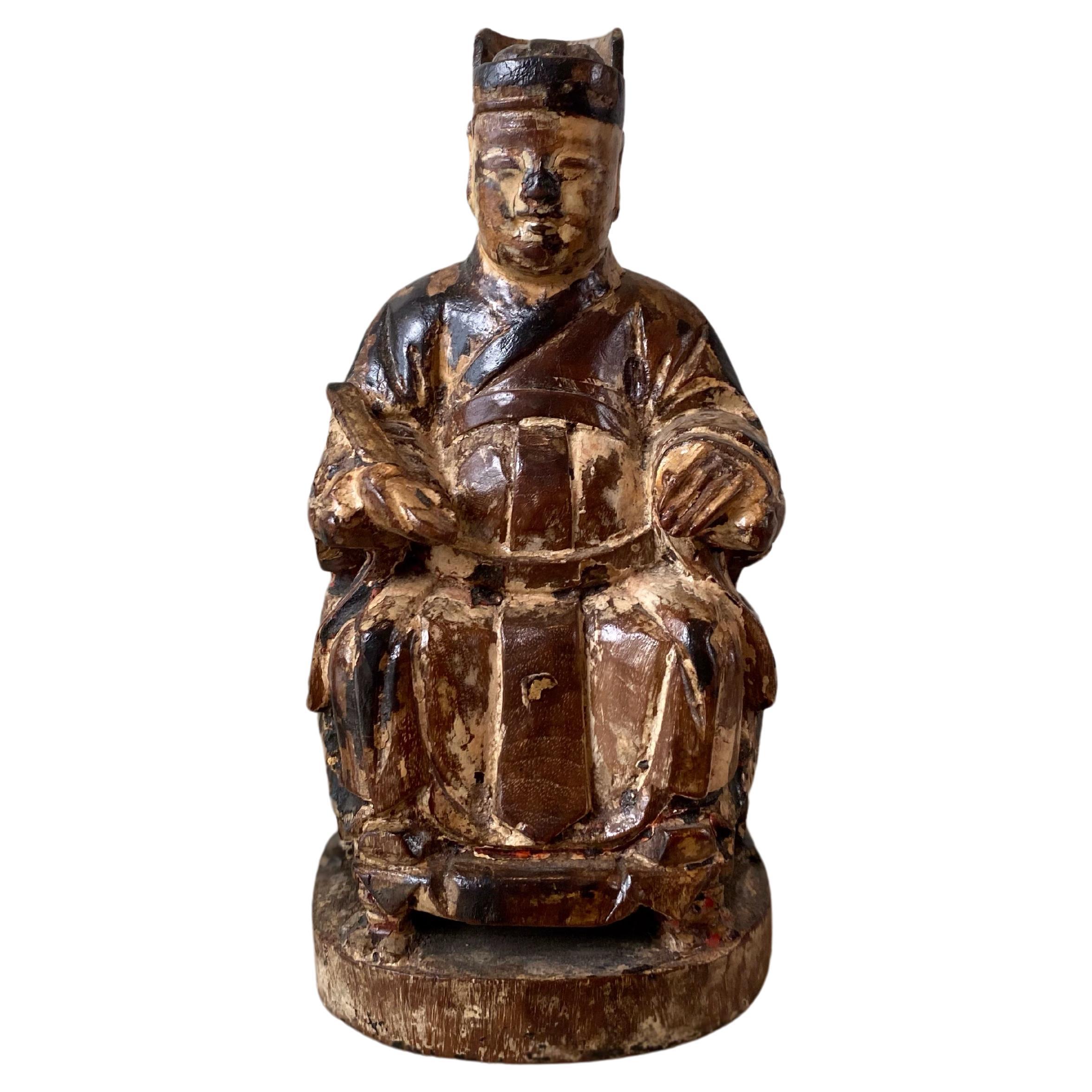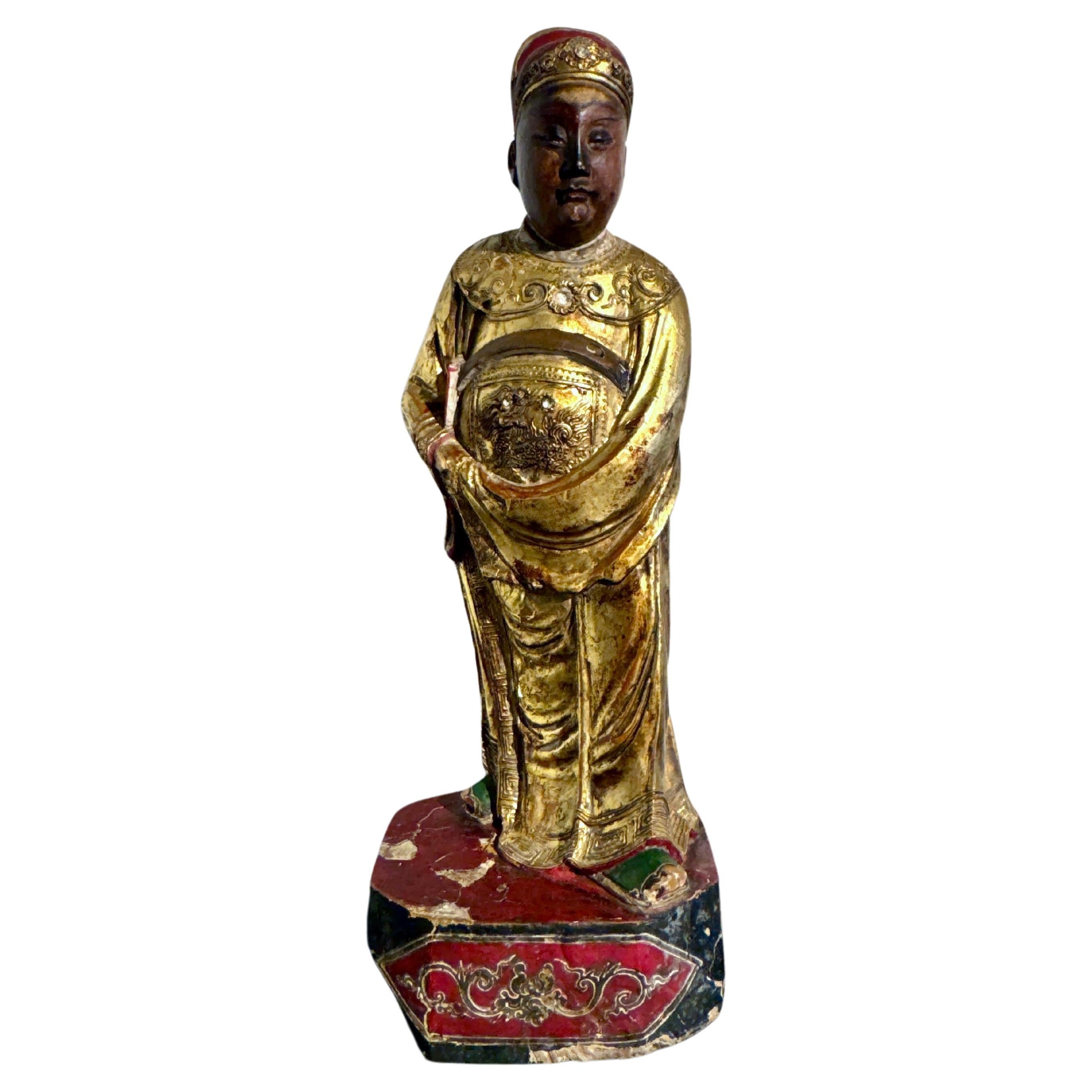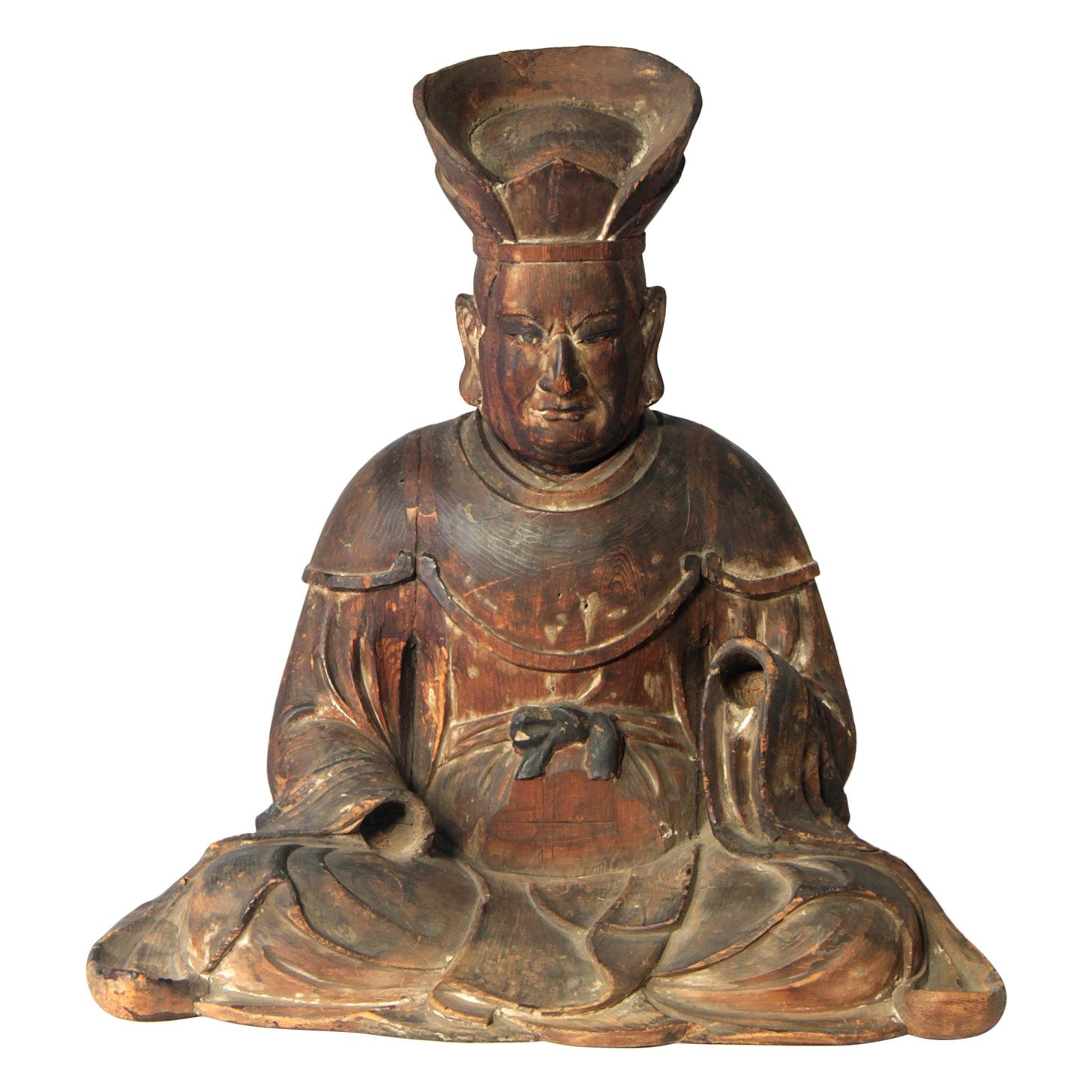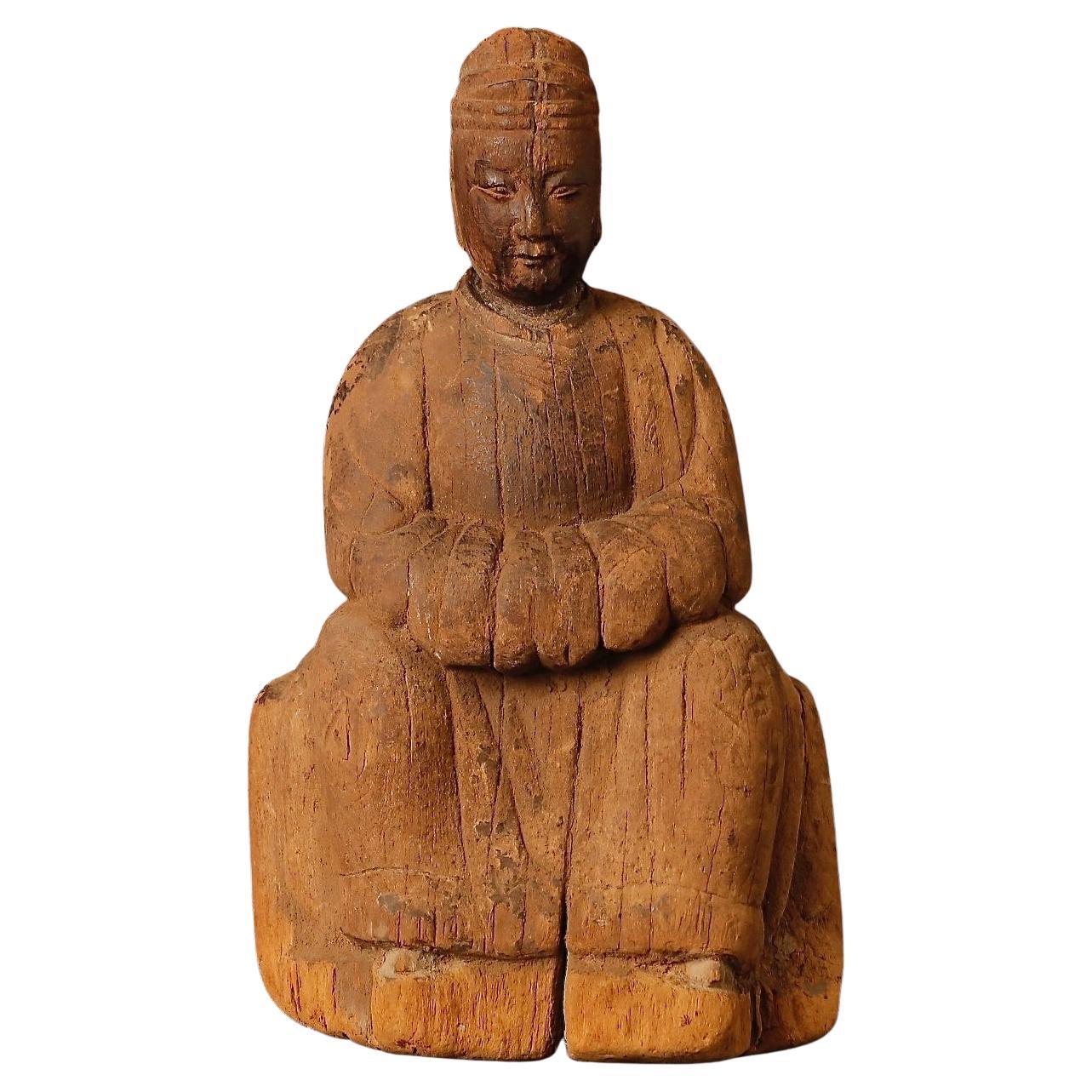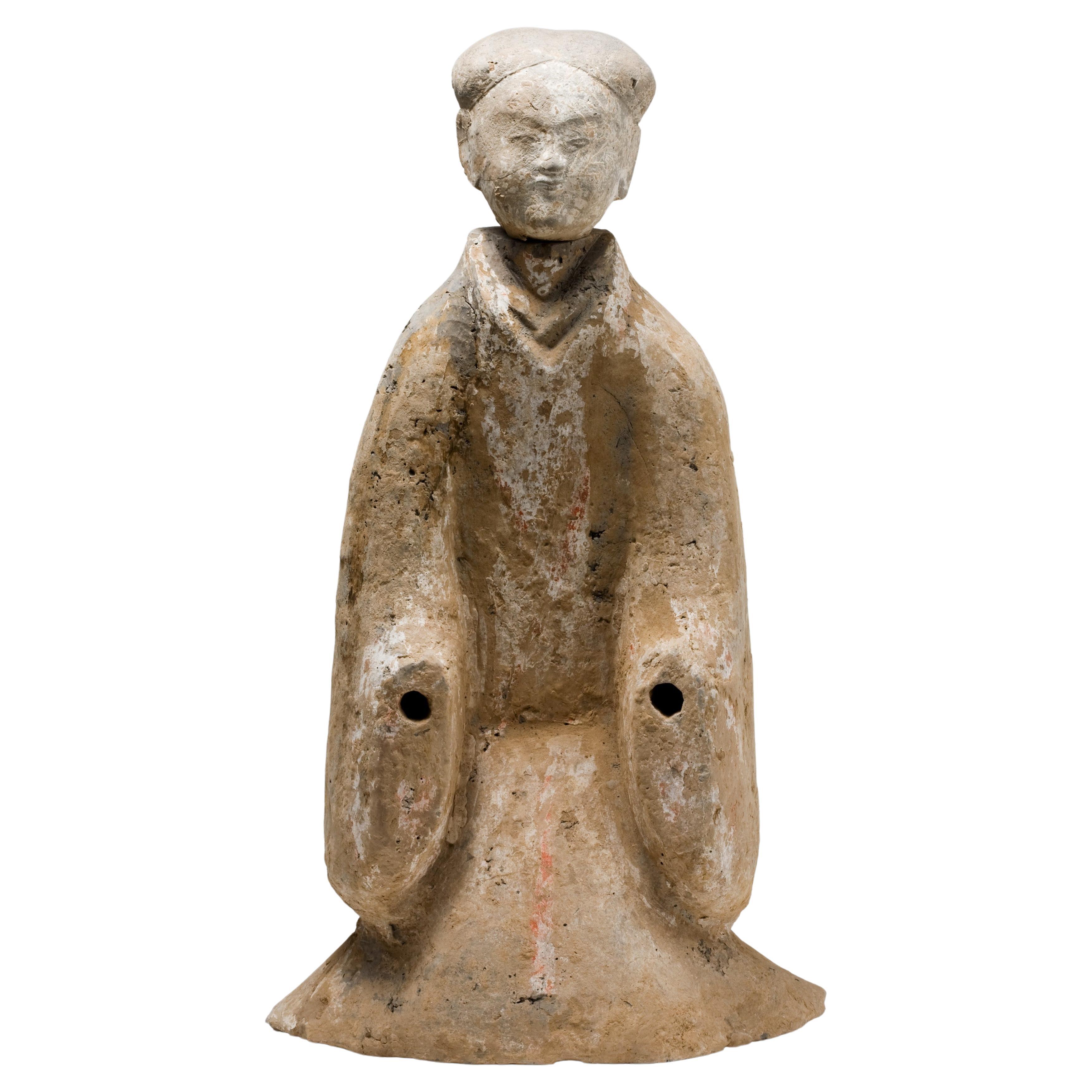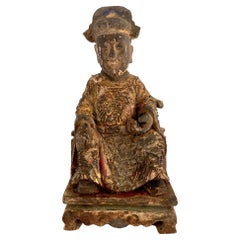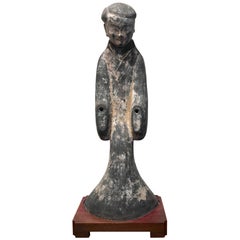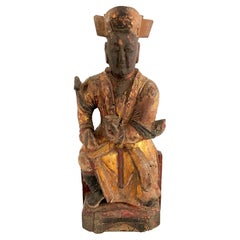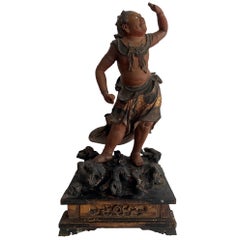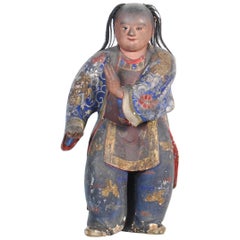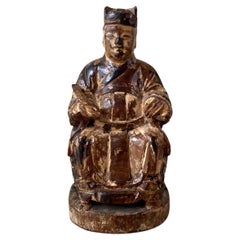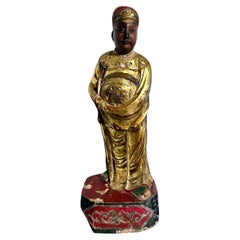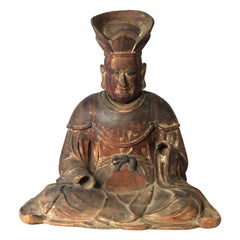Items Similar to Rare Early Korean Buddhist Boy Attendant Figure Dongja Joseon Dyasty
Want more images or videos?
Request additional images or videos from the seller
1 of 21
Rare Early Korean Buddhist Boy Attendant Figure Dongja Joseon Dyasty
$16,800
£12,844.49
€14,794.26
CA$23,541.95
A$26,282.37
CHF 13,771.57
MX$321,722.06
NOK 174,899.06
SEK 164,907.61
DKK 110,411.10
Shipping
Retrieving quote...The 1stDibs Promise:
Authenticity Guarantee,
Money-Back Guarantee,
24-Hour Cancellation
About the Item
A Korean statue of Dongja made from clay/stucco with wood core and painted with polychrome colors circa 18th century of the Joseon Dynasty. The statue is nicely presented on a custom-made stand with wood base. Dongja figures depict boy attendants of important Buddhist deities. Relatively small, they were often positioned as a pair flanking the foot of the central deity on the altar. Made mostly from wood, sometimes stone, and in rare cases, clay and stucco, like the one on offer here, the rendering of Dongjas was often realistic with youthful facial features and attires, in standing pose, holding offerings or praying gesture. Earlier Dongjas tend to be more elaborate. With the Confucianism became dominant in Joseon society, the figure became more austere from the 19th to early 20th century.
The Dongja on offer is rare for being made from clay around wood core with stucco surface. The standing boy attendant holds his hands in praying gesture. He has on him a dhoti-like pants with a tied knot in front and open-chest shirt. His hair was tied up in two knots on top of his head. These features are iconic for mythological child in Eastern Asian Art. The polychrome paint on the surface remains mostly vibrant. The statue itself is 17: in height.
The condition of the statue is quite good considering the age and material. The colors on the front are more vibrant than the back, as the front would have been recolored periodically when the statue was installed, but often to the same degree on the back. Presented in a custom-made display stand, the statue also comes with a wood crate which has a paper label of Hanja writing (Chinese). Dongja Figure from Early Joseon Period.
For a pair of carved wood Dongja, see item 83.174.1-.2 in the collection of Brooklyn Musuem and 2018.63.1a,b in the collection of Portland Art Musuem.
- Dimensions:Height: 19 in (48.26 cm)Width: 8 in (20.32 cm)Depth: 7 in (17.78 cm)
- Style:Archaistic (Of the Period)
- Materials and Techniques:
- Place of Origin:
- Period:
- Date of Manufacture:18th century
- Condition:Wear consistent with age and use. Minor losses. Antique condition in keeping with age and material. Scattered surface scuffs, crackle lines, small scrapes. Small loss on the toe and heel, which reveals the wood core.
- Seller Location:Atlanta, GA
- Reference Number:1stDibs: LU945044547912
About the Seller
4.9
Platinum Seller
Premium sellers with a 4.7+ rating and 24-hour response times
Established in 2006
1stDibs seller since 2010
564 sales on 1stDibs
Typical response time: <1 hour
- ShippingRetrieving quote...Shipping from: Atlanta, GA
- Return Policy
Authenticity Guarantee
In the unlikely event there’s an issue with an item’s authenticity, contact us within 1 year for a full refund. DetailsMoney-Back Guarantee
If your item is not as described, is damaged in transit, or does not arrive, contact us within 7 days for a full refund. Details24-Hour Cancellation
You have a 24-hour grace period in which to reconsider your purchase, with no questions asked.Vetted Professional Sellers
Our world-class sellers must adhere to strict standards for service and quality, maintaining the integrity of our listings.Price-Match Guarantee
If you find that a seller listed the same item for a lower price elsewhere, we’ll match it.Trusted Global Delivery
Our best-in-class carrier network provides specialized shipping options worldwide, including custom delivery.More From This Seller
View All18th Century Chinese Carved Wooden Alter God
Located in Atlanta, GA
This Chinese carved polychrome seated altar god was once used on the family altar to honor their ancestors. Ancestor worship plays a major role in Chinese religion. This beautifully...
Category
Antique Late 18th Century Chinese Sculptures and Carvings
Materials
Wood
Tomb Lady in Waiting Figurine Han Dynasty
Located in Atlanta, GA
On offer is a pottery figurine of lady in waiting, found in the tombs as funeral objects in Han dynasty of China. Generally known as Han tomb ladies, t...
Category
Antique 15th Century and Earlier Chinese Han Ceramics
Materials
Pottery
19th Century Chinese Carved Wooden Altar God
Located in Atlanta, GA
This Chinese carved seated altar god was once used on the family altar to honor their ancestors. Ancestor worship plays a major role in Chinese religion. This beautifully carved figure is rich with character from a century of use with wonder signs of wear. The darken patina is created through years of burning of incense with the original gold gilt painting...
Category
Antique Early 19th Century Chinese Sculptures and Carvings
Materials
Wood, Paint
Japanese Lacquered and Gilt Wood Buddhism Statue from Edo Period
Located in Atlanta, GA
An exceptional and wood statue of Buddhism Guardian Seitaka Doji from Japan circa Edo period (1603-1868), likely the earlier part of 17th century. One of two chief attendants of Fudou Myouou (the other being Kongara Doji), the name of Seitaka Doji is a transliteration of Sanskrit "Cetaka", meaning servant, slave, and he is said to personify expedient action. He is most commonly found on the right side of Fudou, together with Kongara Doji on the left, forming the Immovable triad, Fudou Sanzon, the terror of evil doers. Seitaka largely adheres to the iconography of a wrathful youth with fleshy body and face, skin in the color of a red lotus, has his hair tied in five knots, and holds a vajra in his left hand and a vajra-club in his right hand, but the actual artistic representations of him in Japan do...
Category
Antique 17th Century Japanese Japonisme Sculptures and Carvings
Materials
Metal
Chinese Terracotta Tomb Figure East Han Dynasty
Located in Atlanta, GA
A small Chinese terracotta tomb figure (Ni Yong) from East Han dynasty (25-220 AD), likely from the area of nowadays Sichuan. It depicts a sitting male wit...
Category
Antique 15th Century and Earlier Chinese Han Ceramics
Materials
Terracotta
Chinese Terracotta Statue Tomb Figure East Han Dynasty
Located in Atlanta, GA
A Chinese terracotta tomb figure (Ni Yong) from East Han Dynasty (25-220 AD), likely from the area of nowadays Sichuan. It depicts a horse groomer with tool and harness in hand. Dres...
Category
Antique 15th Century and Earlier Chinese Archaistic Sculptures and Carvings
Materials
Clay
You May Also Like
Rare Antique Statue of a Chinese Child Performing Tai Chi
Located in Prahran, Victoria
Rare Japanese antique statue of a Chinese child performing Tai chi capturing the pose in motion. Middle Edo period, circa 1750. Made from polychrome on carved ...
Category
Antique Mid-18th Century Japanese Edo Sculptures and Carvings
Materials
Cypress
$2,880 Sale Price
20% Off
Early 20th Century Kitchen God Deity Statue
Located in Singapore, SG
A handsome wooden figure of the Kitchen God (灶神 in Chinese, pronounced zào shén), the Chinese name can also be translated into Stove God. He is a popular a...
Category
Early 20th Century Chinese Qing Sculptures and Carvings
Materials
Sandalwood
Chinese Taoist Figure of Wenchang, Late Qing Dynasty, c. 1900, China
Located in Austin, TX
A tall and impressive figure of the Taoist deity Wenchang Wang, carved, gessoed, lacquered, gilt and polychromed wood, Late Qing Dynasty, circa 1900, Fujian, China.
Wenchang, the T...
Category
Antique Early 1900s Chinese Qing Sculptures and Carvings
Materials
Wood
18th Century Chinese Wooden Figure 'Wanli'
Located in Esbeek, NL
18th century Chinese wooden figure, depicted Wanli.
See old sticker on the back of the figure, see picture.
Category
Antique 18th Century Chinese Sculptures and Carvings
Materials
Wood
Stunning Ming Period Male Deity Sculpture – 14th–17th Century China
Located in Fukuoka, JP
A rare and evocative wooden sculpture of a male deity, dating to the Ming dynasty (14th–17th century), China. The figure’s calm expression and dignified posture reflect the spiritual...
Category
Antique 15th Century and Earlier Chinese Ming Religious Items
Materials
Wood
Large Pottery Standing Figure of Attendant, Han dynasty
Located in seoul, KR
This artwork, acquired in Hong Kong during the 1990s, is presumed to have been produced in the same kiln from the Han dynasty, based on the head of the Sotheby's reference piece, which also originated from Hong Kong. Furthermore, given its almost identical shape to the piece from the Artemis Gallery...
Category
Antique 15th Century and Earlier Hong Kong Han Antiquities
Materials
Pottery
$3,213 Sale Price
30% Off
More Ways To Browse
Small And Boyes
Antique Clay Art
Stucco Antique
Polychrome Wood Carving
Antique Wood Crate
Praying Hands
Small Altar
Boy Statue
Altar Stand
Asian Display Case
Antique Hand Carved Stone Figure
Child Head Sculpture
Polychrome Wood Statue
Carved Wood Deity
Chinese Stone Statue
Stone Altar
Antique Deity Statue
Chinese Wood Carved Chest
